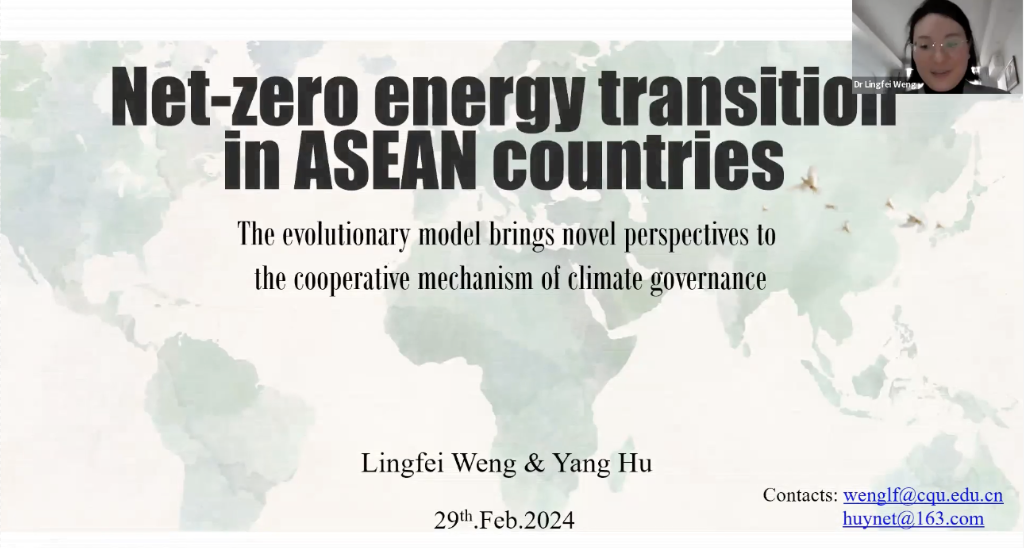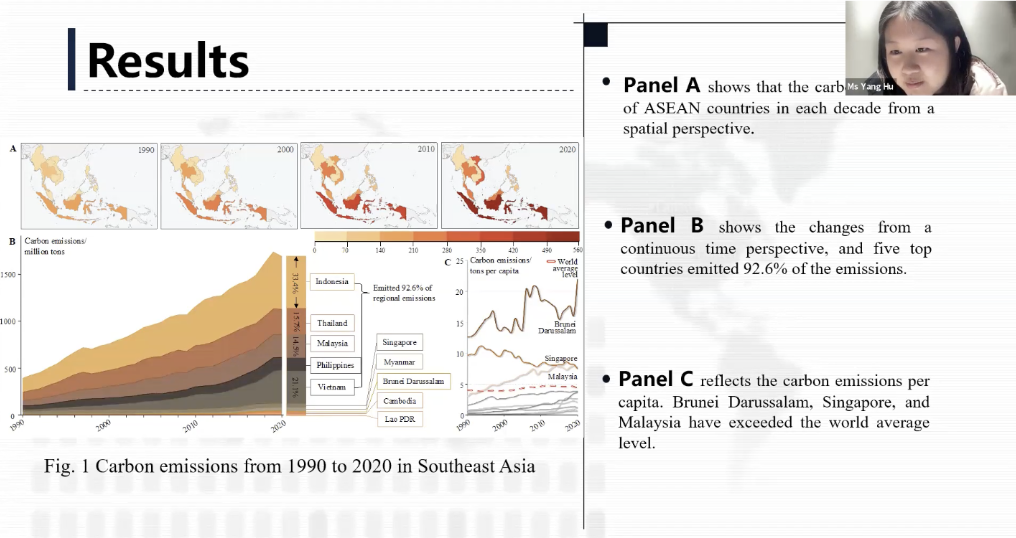i
i
Zoom, 29 February 2024
On 29 February 2024, the ASEAN Climate Change and Energy Project (ACCEPT) Phase II hosted its fourth rendition of the ARNECC Paper Talks moderated by Ms. Indira Pradnyaswari from the ASEAN Centre for Energy. In this opportunity, ACCEPT II invited Dr Lingfei Weng and Ms. Yang Hu of Chongqing University to present their paper on “Net-zero energy transition in ASEAN countries: The evolutionary model brings novel perspectives to the cooperative mechanism of climate governance”.

Photo 1. Presentation by Dr Lingfei Weng
Dr Lingfei Weng gave a well-rounded explanation on the study which aims to understand the primary driving factors of carbon emissions in the ASEAN region. Collecting data from 1990 to 2020 across ten different countries, this study uses the Logarithmic Mean Divisia Index model to replicate the relationship between carbon emissions and four divers consisting of population, per capita GDP, energy consumption per unit of GDP and carbon emission per unit of energy consumption.
Ms. Yang Hu then further explained the other methodologies used in the paper combining statistical methods, mathematical and algorithmic methods. The study also used the Autoregressive Integrated Moving Average model (ARIMA), to investigate growth patterns on the historical carbon emissions in each ASEAN country. Data used in the study was taken from the World Bank and the Energy Information Administration.

Photo 2. Presentation by Ms. Yang Hu
In their findings, the study shows that carbon emissions in the ASEAN countries grew steadily throughout the years, with Indonesia being the most pronounced emitter in the region. Ms. Yang Hu also mentioned countries such as Singapore, Brunei Darussalam, and Malaysia, where emissions were growing slower, but their capita emissions still exceeded the world average level. She then presented other findings which show how these growths were driven by different aspects such as population, economy, and technology.
Alongside the historical growth of carbon emissions in the ASEAN countries, the study also showed future projections of these emissions under two different scenarios. The first scenario shows the forecast of carbon emissions if things were to run like business-as-usual (BAU) or if no new policies are made. The second presents an optimistic scenario in which ASEAN countries were to take steps to enhance energy transition efforts in their respective countries. Ms. Yang Hu stated that the average ASEAN country would need to decrease their fossil energy consumption by around 21.79% every five years without considering population and economic slowdown. Especially for developing countries in the region where projections of carbon emissions rising are higher, this is quite a challenge and requires collective efforts to be able to achieve this target.
Ms. Yang Hu recommended that ASEAN hold more global activities to help in public awareness and knowledge sharing, involving more youth in the process because they are the future of climate governance. She also said it is important to enhance the national capacity to bolster energy transition and accelerate development of information technology and green manufacturing systems. Last, ASEAN countries could build an energy infrastructure connectivity which could help advance energy transition. All this should be done through cooperation and collaboration between ASEAN countries.
Concluding the session, Ms. Indira expressed her gratitude to Dr Lingfei Weng and Ms. Yang Hu for their participation in the event and in providing valuable insights from their study. Ms. Indira also summarized the key highlights of the day’s discussion, emphasising on the impacts of population, economy and technology of a country towards carbon emissions emitted in the ASEAN region. There is a gap between the policy and actual actions carried out by ASEAN countries causing them to potentially not be able to reach their carbon targets. However, if ASEAN can reduce the use of fossil fuels by around 21% every five years, the region could still make their net zero target. The study also puts focus on international technology innovation assistance, regional collaborative governance and multi-stakeholder negotiations as promising approaches for these relevant actors to move towards a net zero future.
Written by Keisha Aurel Christian and Indira Pradnyaswari
Join our ASEAN Researchers Network on Climate Change (ARNECC) by registering yourself here. Become a part of our collaborative efforts to address pressing climate challenges and shape a sustainable future.
Detailed information on ACCEPT II can be found at https://accept.aseanenergy.org/
We welcome any future collaboration, please feel free to contact us at [email protected]